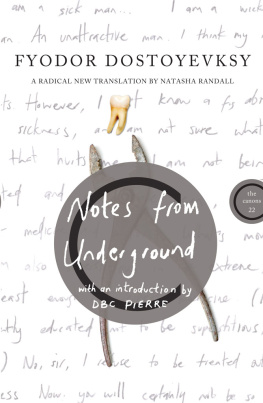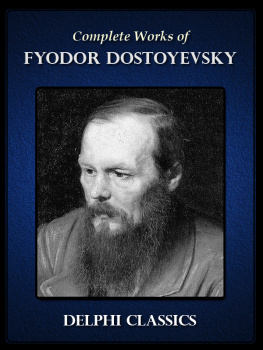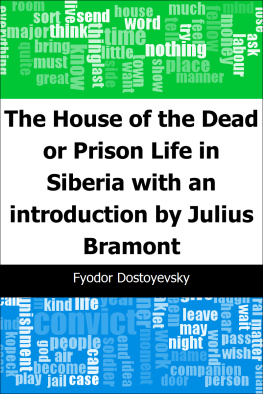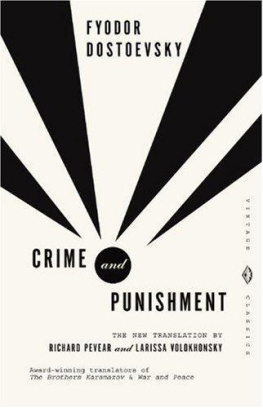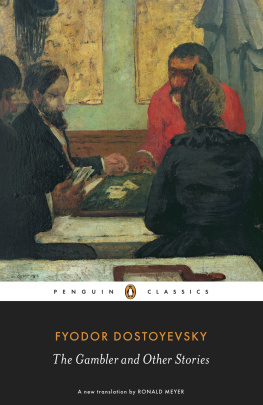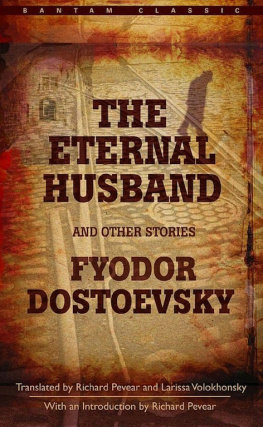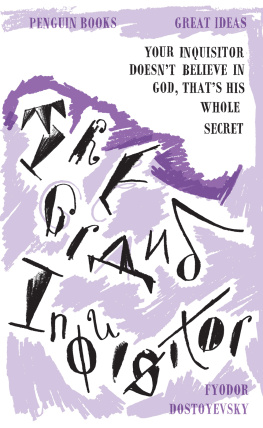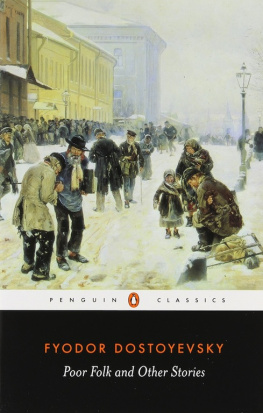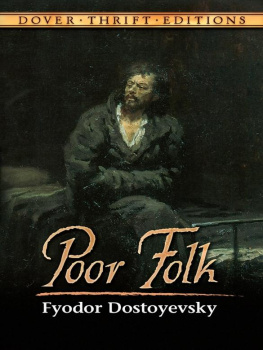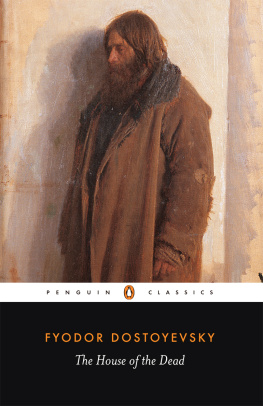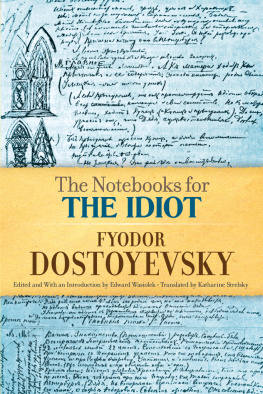Fyodor Dostoyevsky - Notes From Underground
Here you can read online Fyodor Dostoyevsky - Notes From Underground full text of the book (entire story) in english for free. Download pdf and epub, get meaning, cover and reviews about this ebook. year: 2012, publisher: Canongate Books, genre: Art. Description of the work, (preface) as well as reviews are available. Best literature library LitArk.com created for fans of good reading and offers a wide selection of genres:
Romance novel
Science fiction
Adventure
Detective
Science
History
Home and family
Prose
Art
Politics
Computer
Non-fiction
Religion
Business
Children
Humor
Choose a favorite category and find really read worthwhile books. Enjoy immersion in the world of imagination, feel the emotions of the characters or learn something new for yourself, make an fascinating discovery.
- Book:Notes From Underground
- Author:
- Publisher:Canongate Books
- Genre:
- Year:2012
- Rating:3 / 5
- Favourites:Add to favourites
- Your mark:
- 60
- 1
- 2
- 3
- 4
- 5
Notes From Underground: summary, description and annotation
We offer to read an annotation, description, summary or preface (depends on what the author of the book "Notes From Underground" wrote himself). If you haven't found the necessary information about the book — write in the comments, we will try to find it.
Notes From Underground — read online for free the complete book (whole text) full work
Below is the text of the book, divided by pages. System saving the place of the last page read, allows you to conveniently read the book "Notes From Underground" online for free, without having to search again every time where you left off. Put a bookmark, and you can go to the page where you finished reading at any time.
Font size:
Interval:
Bookmark:
Also by Fyodor Dostoyevsky
FICTION
Poor Folk
The Double: A Petersburg Poem
Netochka Nezvanova
Uncles Dream
The Village of Stepanchikovo
Humiliated and Insulted
The House of the Dead
Crime and Punishment
The Gambler
The Idiot
The Eternal Husband
Demons
The Adolescent
The Brothers Karamazov
SHORT STORIES
Mr. Prokharchin
Novel in Nine Letters
The Landlady
The Jealous Husband
A Weak Heart
Polzunkov
The Honest Thief
The Christmas Tree and a Wedding
White Nights
A Little Hero
A Nasty Anecdote
The Crocodile
Bobok
The Heavenly Christmas Tree
The Meek One
The Peasant Marey
The Dream of a Ridiculous Man
PLAYS
The Jew Yankel (unknown whether finished or not)
ESSAYS
Winter Notes on Summer Impressions
A Writers Diary
Complete Letters

This new translation first published in Great Britain in 2012 by
Canongate Books Ltd, 14 High Street, Edinburgh EH1 1TE
www.canongate.tv
This digital edition first published in 2012 by Canongate Books
Translation copyright Natasha Randall
Introduction copyright DBC Pierre
The moral right of the translator has been asserted
British Library Cataloguing-in-Publication Data
A catalogue record for this book is available on request from the British Library
ISBN 978 0 85786 021 7
eISBN 978 0 85786 128 3
Typeset in Goudy by Palimpsest Book Production Ltd, Falkirk, Stirlingshire
INTRODUCTION
But, it also seems to us that we may stop here.
Picture the human zoo as a nervous system. Artists and thinkers drift to the nerve-endings, seeking answers in the sparks of single filaments, feeding back flickers in which we see ourselves across the complex, because were connected, because even signals from the toes reflect us. Then a writer finds the brain-stem and sends ideas so central to who we are that they light the network at once and for ever.
That for me describes the scale of this little book.
I only want to spend a sentence on the story; youll be there in a page or two anyway. Have no fear of too many surnames in a Russian salon this is a bitter tirade by one spiteful ex-civil servant who snipes at the ideas of his time from a basement in St Petersburg. The Underground Man is bizarre, brilliant, tragic, unexpected our scholars will tell us hes the first modern anti-hero, an early first-person voice, Dostoyevskys first great work, the seed of later masterpieces. And all this is true, but heres the thing: within the concept of this disaffected man, and inside all his arguments, sits one stunning idea, one I feel is more relevant today than ever, one which not only made me sense a kindred spirit, but which licensed my humanity outright.
To even begin to introduce Notes from Underground I need to position air crashes and socks in your mind as extremes on the same spectrum. Ill sketch the spectrum like this: following the tragedy of September 2001, a decades-long inquiry was completed into human responses to mortal danger. Reports from the twin towers were combined with air-crash studies to show who we really are when the chips are down. And it turns out that eighty-five per cent of us, when faced with death unless we act, will do nothing. Others will panic uselessly. So thats extreme duress. At the other end of the spectrum extreme absence of duress is me finding socks. Which is to say, finding one, wandering around, leaving it behind, taking a shoe to find the other, returning with the sock but leaving the shoe behind. This is me, whose eyes only itch when theres something on my fingers which will hurt them. I dont say this is also you. But heres the point: there are enough of me around to ask which imbecile ever thought it a good idea to base social, political, and economic systems on the assumption that humans will act purposefully and correctly, even in their own best interests. Look around us, at economies, ideologies.
All have failed because their systems assume we will do the right thing.
This is the gift of Notes from Underground. Dostoyevsky dropped a pill into the middle of the nineteenth century and the thing is still fizzing: existentialism. The notion that history is not built from purposeful steps. That we might not be interested, obliged or even able to do the correct thing that we might not know what the correct thing is, or care.
That basically we might not end up wanting to do anything at all.
Why did the teenager cross the road? Because somebody told him not to. This is the essence of the Underground Man, running the other way just to prove his autonomous existence except that in this case the philosophies grew far beyond the remit of a novel. They became ideas that continue to change the world. Notes from Underground first appeared in Russia in 1864, in the middle of one of historys most fertile periods. Of course the author was speaking to his time, addressing the discourses around him, as youll see the Underground Man do in detail, but for me two things set the work apart from its time and pull it sharply into ours. The first is that Russian novels up to this point were concerned with action; they hung on what their characters did, while Dostoyevsky became concerned with motivation, with the curious machinations of the mind. He was a psychologist before psychology existed, and his observations were acute and universal. The second is the fact that the nineteenth-century themes addressed by the Underground Man are the seedlings of the themes of our day industrialism, utopianism, western markets, the grip of science and technology on truth and for me his arguments not only still apply but have new weight.
Still, all this thought is woven through the ramblings of an unpleasant and contradictory man, making it an artwork the Underground Man spends the first section of this short novel in bitter monologue from his basement, and the second part narrating the scenes which led to his seclusion, and which may underpin his ideas. I say may as he remains an unreliable narrator throughout. Only Dostoyevsky knew how much of the Underground Man was himself, but I can give you the clues I used to reconcile the author and his character.
I always felt a particular kinship with Dostoyevsky, perhaps from our having grown up in similar, walled compounds, having been warned not to explore outside alone, having ignored the warning and seen chaos, violence and cruelty first hand, and at a young age. Perhaps we were similarly addictive, rode similar roller coasters of fortune we both took a kicking for second novels, both threw everything at our first. He even declared What matters is that my novel should cover everything. If it does not work I will hang myself.
Whereas I would have driven off a cliff.
Its easy to see historical figures as one-dimensional icons, their lives as full of aplomb as quotes by Oscar Wilde. But Fyodor Mikhailovich Dostoyevsky was not this way, and I realise the coincidences above are not the cause of my feeling; rather the feeling is one you and I both might have, in sharing his weaknesses. He was a sensitive man, as sensitive as a synapse, and deeply affected by life. He was insecure, by turns aloof or withdrawn, and one thing he almost certainly shared with the Underground Man was torment while he wrote this book his wife lay dying, he was almost broke, having gambled his livelihood away, and his appeal as a writer was waning.
Next pageFont size:
Interval:
Bookmark:
Similar books «Notes From Underground»
Look at similar books to Notes From Underground. We have selected literature similar in name and meaning in the hope of providing readers with more options to find new, interesting, not yet read works.
Discussion, reviews of the book Notes From Underground and just readers' own opinions. Leave your comments, write what you think about the work, its meaning or the main characters. Specify what exactly you liked and what you didn't like, and why you think so.

